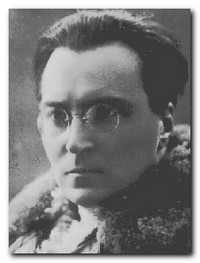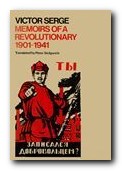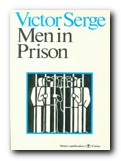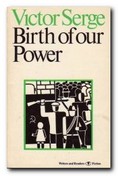revolutionary hopes betrayed
Victor Serge is one of the most undeservedly neglected writers of the twentieth century. In his introduction to this recent translation of Unforgiving Years, Serge scholar Richard Greeman speculates that this might be because he cannot be easily categorised into any national literary tradition. Serge was born of Russian emigré parents in Brussels. He travelled widely throughout Russia and Europe as a revolutionary, and he wrote in French. Indeed, this linguistic fact may well have saved his life, because he was one of the few Oppositionists in Stalin’s reign of terror who was given permission to leave the Soviet Union – largely as a result of an international protest organised in France.
 Unforgiving Years is one of his last great works, written in exile in Mexico around the same time as Memoirs of a Revolutionary and The Case of Comrade Tulayev. It covers the years 1939-1945 and is split into four distinct sections, each one of which illustrates a facet of ‘Midnight in the Twentieth Century’ as Europe was plunged into horrifying conflicts dominated (at first) by two conflicting forms of totalitarianism. The first section is set in Paris at an unspecified period just before the outbreak of war.
Unforgiving Years is one of his last great works, written in exile in Mexico around the same time as Memoirs of a Revolutionary and The Case of Comrade Tulayev. It covers the years 1939-1945 and is split into four distinct sections, each one of which illustrates a facet of ‘Midnight in the Twentieth Century’ as Europe was plunged into horrifying conflicts dominated (at first) by two conflicting forms of totalitarianism. The first section is set in Paris at an unspecified period just before the outbreak of war.
Two secret agents, Sasha and Nadine, decide they no longer believe in the infallibility of the Party and its policies, and they decide to escape – knowing that they will be hunted down and possibly assassinated by agents – as many people were at the time. Every move they make is fraught with danger, and they fear betrayal at every step – even from each other. The Spanish civil war has ended in defeat, the liberal democracies are capitulating before the threat of Nazism, and Stalin is purging everyone in his wake – even including leading intellectuals and his best military commanders, just when he will need them most.
In part two, one of their comrades is sent on a mission to a frozen Leningrad besieged by the Germans in 1941 – to endure unimaginable hardships in support of one corrupt regime resisting another. Although Serge’s sympathies are clearly with the Russian people and not with the Stalinist aparatchicks, he might not have known at the time of writing that Stalin turned out to be responsible for killing more Russians than Hitler.
Daria – the only character to appear in all four parts of the book – tries hard to be a loyal Party agent, but she cannot stop herself questioning the perverted logic of any means, no matter how corrupt, justifying some theoretical ends. She cannot rid herself of humane sympathies for the people she sees suffering around her. In a novelistic sense she stands in for Serge himself, desperately trying to locate a set of values which will accommodate both aspirations towards democratic socialism and a liberal humanism which she can hardly even admit to herself.
Part three takes place in a Berlin devastated by allied carpet bombing as the Reich nears its apocalyptic end. Daria has volunteered for a mission behind enemy lines, working as a nurse under an assumed identity. Serge’s skill in this section is to recount the events from the points of view of loyal (non-Nazi) Germans, their belief in the war almost at breaking point. All the official news is ridiculously optimistic propaganda, and the entire population is surrounded by officials with orders to root out and destroy the slightest signs of doubt in the Fuhrer’s omnipotent wisdom – just as was happening in the East.
Throughout all the horrendous conditions he describes, the Comrades all behave impeccably – with only their ideological doubts bringing them down to the level of normal human beings. Of course they reflect the intellectual journey which Serge had made himself. But it should be borne in mind that the saintly Daria/Erna, whilst sleeping with young men out of compassion and tending war-shattered enemies in her capacity as a spy behind the front line, is in fact reporting back to a regime which was systematically slaughtering its soldiers who had come back from fighting the Nazis because they might have been tainted with democratic ideas – and were actually accused of being German spies. The Comrades can be admired for their aspirations, but they clung on to their allegiances for too long – though of course it’s easy for us to say that now.
In part four Daria has finally broken ranks with the Party and escapes to the New World to start a new life. She eventually locates Sasha and Nadine, who have retired to run a plantation in rural Mexico – hidden away from everyone. Sasha has resolved his ideological dilemma by making a connection with the primitive forces of an almost prehistoric world, yet he still wonders ‘Where did we go wrong?’ Nadine has ‘retreated’ into a mild form of schizophrenia. But just as they have feared all along, the Party will not forgive recusants, and a visiting archeologist turns out to be a Stalinist agent. He infiltrates himself into their confidence, poisons Sasha and Daria, then moves on to his next assignment.
It’s possibly the bleakest of all Serge’s novels – and no wonder. He himself was still being pursued by Stalin’s agents when he died (of a heart attack) in Mexico in 1946. Anyone not used to his narrative techniques might find the story difficult to follow. He was trying to escape the form and the methods of the traditional bourgeois novel by downgrading the individual in favour of the mass – a theory he expounds in Literature and Revolution. Fortunately he never quite managed it, but since he also fused his narrative with a poetic lyricism, the results are magnificent.
© Roy Johnson 2009
Victor Serge, Unforgiving Years, New York: New York Review Books, 2008, pp.341, ISBN 1590172477
More on Victor Serge
Twentieth century literature
More on biography
 Victor Serge (1890-1947) wrote under the most difficult conditions, much of the time whilst living in exile – in his adopted homeland Russia, in France, and in Mexico. He frequently had to write in secret and he smuggled his work out of the Soviet Union to be published in France and Spain. His work was banned throughout the communist period in Russia, and it has only recently become available there. It also has to be said that his work goes in and out of print rather a lot in English-language publications. A gifted linguist, he chose to write in French. Besides being the preferred language of Russian intellectuals of his generation, French assured him an international audience.
Victor Serge (1890-1947) wrote under the most difficult conditions, much of the time whilst living in exile – in his adopted homeland Russia, in France, and in Mexico. He frequently had to write in secret and he smuggled his work out of the Soviet Union to be published in France and Spain. His work was banned throughout the communist period in Russia, and it has only recently become available there. It also has to be said that his work goes in and out of print rather a lot in English-language publications. A gifted linguist, he chose to write in French. Besides being the preferred language of Russian intellectuals of his generation, French assured him an international audience.

